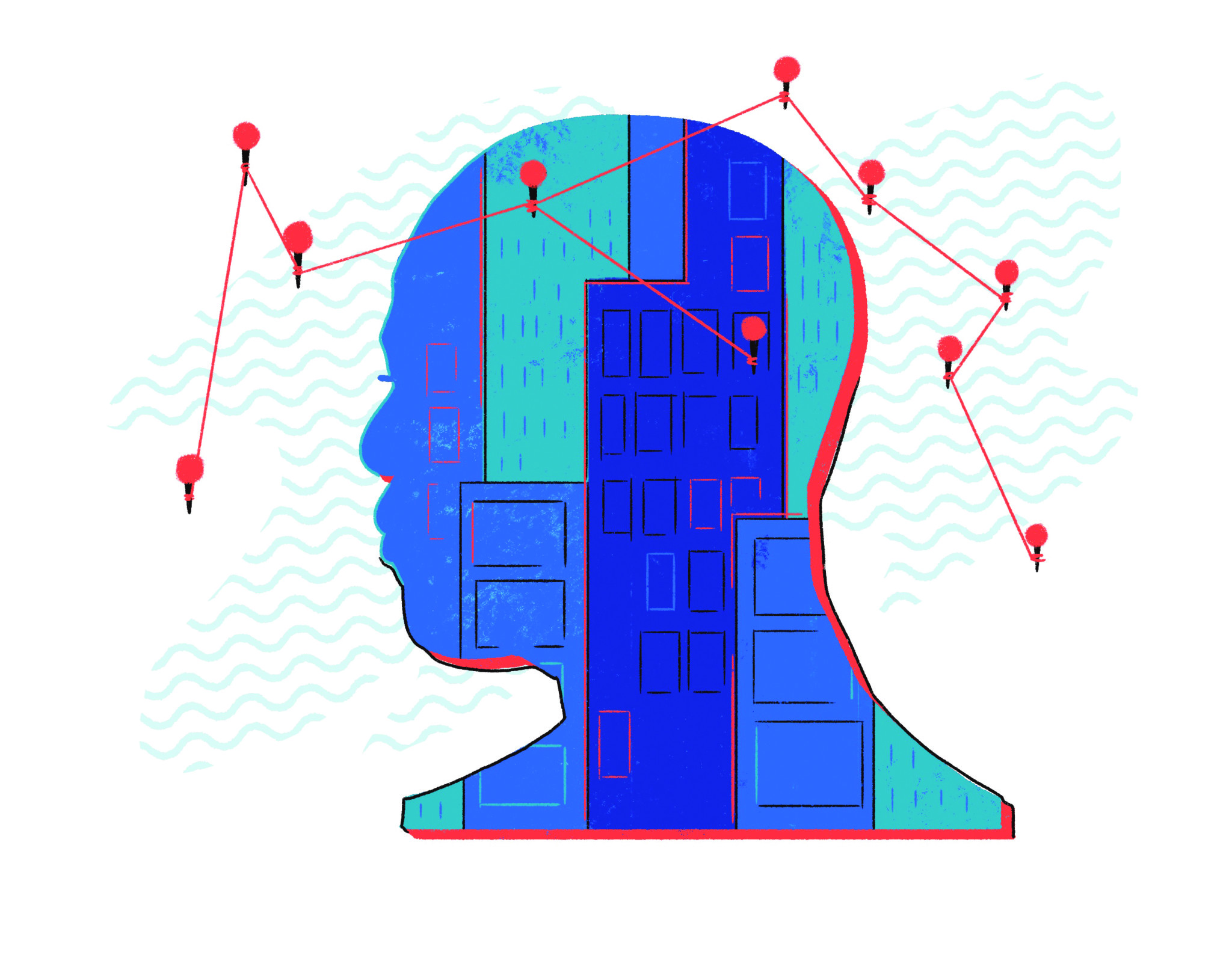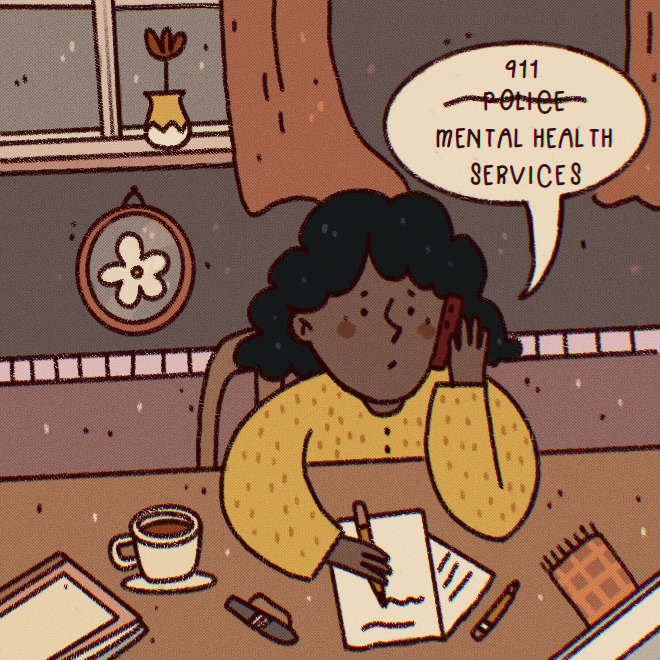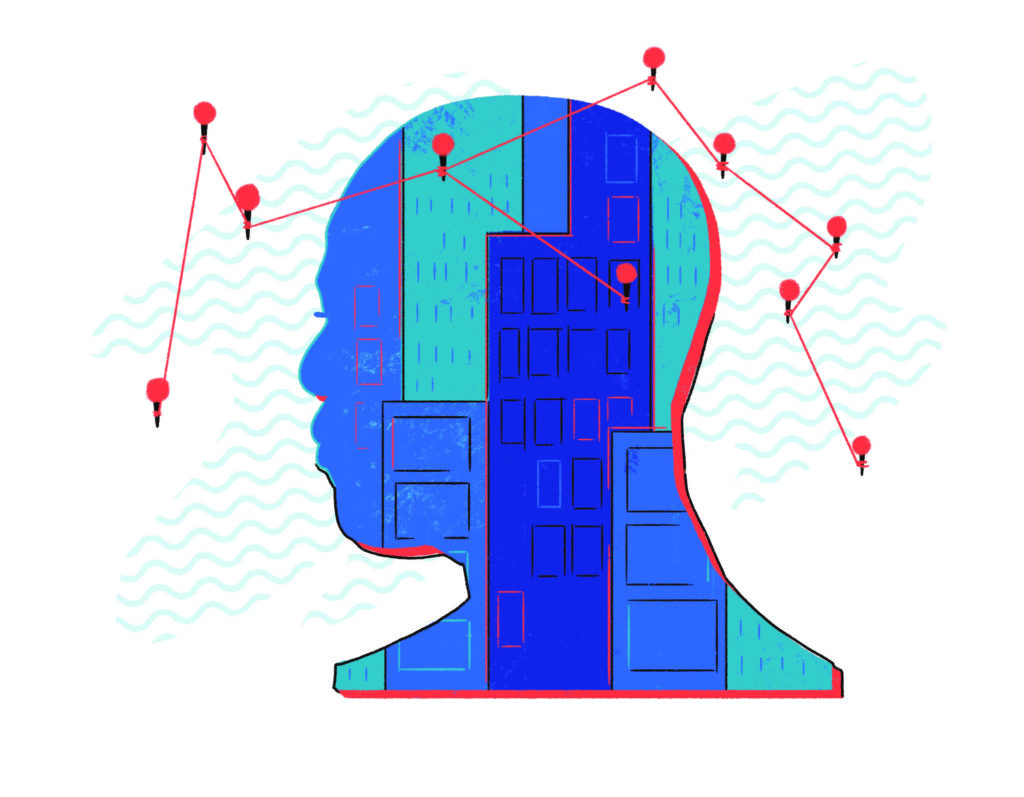Care Beyond the Crisis Moment
Written by members of the Collaborative for Community Wellness
Mayor Brandon Johnson’s 2024 budget allocates $5.2 million to reopen two public mental health centers and $15.9 million to hire additional mental health professionals. These investments are vital, but insufficient to address decades of disinvestment from public mental health services.
The Chicago Department of Public Health (CDPH) operated nineteen public mental health centers and an alcohol treatment center in 1989. By 2011, there were just twelve public mental health centers.
Today, only five remain open.
Within this landscape, mental health needs often go unaddressed until they reach a point of crisis. Removing police from the crisis response is a priority for our city. In addition, we must recognize that the crisis moment is too late for meaningful intervention for people struggling with mental health challenges.
New research reports from the Collaborative for Community Wellness (CCW) and the UIC Community Research Collective lend support to community demands for building an accessible, patient-centered, high-quality public mental healthcare system to serve the people of Chicago.
Divestment from public mental health services has created a dynamic where mental health challenges are more likely to escalate to the level of acute crisis while relying on police for crisis response is further traumatizing and does nothing to reduce future crises. Key points of failure in the current system include limited access to preventive services, coercive short-term medical treatment, and a lack of long-term, post-crisis support options.
Privatization has severely limited access to preventive services within Chicago’s mental health service landscape. In 2023, the CCW assessed service accessibility by conducting a phone survey of private, non-profit providers that received funding from the city of Chicago to deliver mental health services. Although former Mayor Lori Lightfoot described these providers as offering services “without access barriers,” findings from the CCW’s research reveal that Chicago’s privatized mental health service landscape is far from facilitating no-barrier access.
Volunteer callers were only able to complete phone surveys with 42 percent of agency locations, pointing to challenges navigating phone systems and connecting with organizational representatives. Furthermore, more than half (56 percent) of surveyed locations had a wait time of one month or longer to initiate services; 15 percent reported that they did not serve individuals who were undocumented; and only 41 percent offered free services.
Of a total of 80 agency locations, only five were found to be without any access barriers. These five barrier-free locations were concentrated within four Chicago community areas, providing evidence that the vast majority of Chicago’s population does not have access to barrier-free mental health services through a privatized provider. This assessment mirrored findings from research that CCW conducted in 2021, which demonstrated that access barriers through privatized providers are a long-standing problem and have remained consistent over time.
With a divestment in public services and limited access through privatized providers, it is not surprising that Chicagoans are unable to address their mental health needs until they reach a point of crisis. The CCW’s analysis of 911 behavioral health calls from January 2019 through February 2022 indicated that the highest rate of calls are concentrated in parts of the city where public mental health centers have been closed. These findings point to the dire consequences of divestment when Chicago residents are left with no other recourse but to call 911 to address their mental health needs.
From July through October 2023, the UIC researcher team conducted interviews with Chicagoans who shared stories about their encounters with the city’s crisis response system and the aftermath of these crisis moments. Several respondents explained that they feared calling 911 for mental health crisis support because they expected police to escalate the situation and criminalize and stigmatize the person experiencing a crisis.
911 is too little, too late for Chicagoans struggling with mental health challenges. Respondents asked for a hotline option other than 911 that would provide mental health support. Many respondents also called for reopening and expanding public mental health centers in their neighborhoods. The participants also made clear that preventative support needed to include broader services including housing, food resources, job training, and other healthcare, to prevent the kinds of acute life crises that often escalate into mental health crisis events.
The current options in the aftermath of a crisis are also ineffective and further traumatizing. The typical response involves transport to a hospital where initial triage occurs. The person experiencing a crisis is then either treated at the hospital until they are considered stabilized or transferred to an in-patient psychiatric clinic for treatment.
These stays are often involuntary, meaning that people cannot decide for themselves when to leave treatment. During periods in medical custody, people are forced to participate in treatment that they do not desire or consent to. Multiple respondents explained that involuntary commitment felt coercive and did not result in improvement in their mental health.
Inpatient treatment also exposed participants to dehumanization and stigmatization from care providers. Respondents reported that they were not allowed contact with family members and that they were subjected to unnecessary sedative medications. No respondent described receiving post-crisis support that went beyond this initial medical custody. Thus, the medical care received as a crisis response was temporary and often unsatisfactory. Participants expressed a desire for access to ongoing therapy support post-crisis, that would help them address their mental health needs in the long-term.
The solution to both a lack of preventive services and the lack of long-term post-crisis support is an investment in public mental health services.
Last summer, the CCW released a whitepaper identifying remedies to the current challenges presented in the research. Public mental health centers provide both the preventative mental health support services that help reduce the likelihood that Chicagoans’ mental health struggles will escalate to the point of crisis by engaging with residents proactively by developing a community care corps, and can also provide long-term, post-crisis intervention programs to help residents improve their mental health and learn strategies to reduce the risk of acute mental health crisis.
The UIC research project found that respondents desired mental health services that were accessible within their neighborhood, community-based, and of high quality. Respondents also shared that mental health services needed to be made more accessible through interventions like transit assistance, expansive clinic hours, reduced wait times, increased staffing, more comprehensive insurance coverage, and other financial support.
Findings from the UIC research project are consistent with recommendations that the CCW has outlined based on years of community-based research on mental health service access and community visions for mental health service delivery. Truly ensuring that mental health services are available for all Chicagoans in their moment of need requires the re-opening of all public mental health centers that have been closed over the past several decades, in order to facilitate access to free, long-term services that are available to everyone, regardless of insurance status and immigration status.
Recognizing the range of medical, material resource, and psychosocial needs that impact mental health, public mental health centers would benefit from operating as integrated service facilities that offer peer support, arts, and culture-focused enrichment activities, medical services, housing assistance, and case management support in conjunction with mental health services. Addressing this range of holistic resource needs is critical to preventing mental health crises and promoting long-term healing when crises do occur.
Addressing holistic resource needs in a manner that is person-centered, culturally affirming, and high quality further requires that the City of Chicago prioritize the hiring of a Community Care Workers corps of individuals who live in the communities where the public mental health centers are located and who have similar lived experiences to the community members who are seeking services.
Investing in a worker corps that community members can trust and relate to promotes affirming and high-quality service delivery, which is essential to both preventing mental health crises and responding to crises through an approach that facilitates long-term healing. Lastly, to ensure that care is long-term following a moment of crisis, it is critical that there is coordination between immediate crisis support and follow-up services.
To this end, public mental health centers should serve as centralized hubs for non-police mobile crisis response teams composed of mental health professionals and peer support workers. Through this approach, mobile crisis response teams will be based at the public mental health centers and will travel to homes and community locations when an individual is experiencing a mental health emergency. Their integration within the public mental health centers will make them best equipped to facilitate a seamless connection to long-term mental health services and other psychosocial supports following the crisis event, in turn building the support systems that are necessary to promote long-term healing and prevent future crises.
By building a public mental health infrastructure that is designed to simultaneously focus on prevention, crisis response, and long-term follow-up care, the city of Chicago can ensure that all Chicagoans can access the care that they need to promote their optimal emotional well-being.
Tirza Ochrach-Konradi, Dr. Andy Clarno, Any Huamani, Cheryl Miller, Kevin Rak, Dr. Caitlin O’Grady, and Dr. Arturo Carrillo are members of the Collaborative for Community Wellness.
Cops out of Crisis Response
Written by members of the UIC Community Research Collective
Mayor Brandon Johnson’s 2024 budget includes $5.2 million to reopen two public mental health centers and expand mental health services, along with $15.9 million to double staffing for the city’s team of professionals who respond to mental health and substance abuse crises. Despite this important allocation of resources, activists and community members aim to implement a more holistic patient-centered vision for equitable mental healthcare in 2024, including removing police from crisis response.
We, the UIC Community Research Collective, partnered with the Collaborative for Community Wellness (CCW) this past summer to interview Chicago residents about their experiences with mental health crisis response. In our newly released report, residents shared stories demonstrating that police typically: 1) escalate the crisis, 2) rely on criminalization and violence, and 3) dehumanize and stigmatize the person experiencing the crisis. Our findings lend support to the CCW’s call to halt co-responder models that deploy police alongside mental health professionals.
For Chicago to truly transform its mental health services, we must prioritize the people trying to access support, and recognize the longstanding personal and community trauma created by police involvement in crisis response, regardless of training.
Chicagoans are familiar with the names Laquan McDonald, Quintonio LeGrier, and Irene Chavez. McDonald and LeGrier were shot and killed by police during mental health crises with sixteen and seven bullets, respectively. Chavez died by suicide in police custody after her repeated pleas for mental healthcare went unheeded.
These disastrous interventions point to a truth many Chicagoans know too well: police involvement in mental health crisis response is harmful.
During our interviews, Chicagoans recounted numerous instances in which police responded to crises with escalation, treating residents in dehumanizing ways. Kim, a twenty-nine-year-old Japanese Filipina woman, was having suicidal ideations when police arrived at her motel room for a surprise wellness check. She was showering, so she answered the door in a towel, only to be dragged out naked on a cold, winter night. “They put me in cuffs. They’re dragging me out without telling me anything. They didn’t tell me it was a wellness check,” Kim recounted. Time and again, police response to crises takes the form of criminalization over care.
As a direct result of harmful encounters, Chicagoans who experience mental health crises do not trust police to handle future crises without responding violently. Caroline, the mother of a Black child, stated she would only call police as a last resort if her child’s life was in danger. Otherwise, she insisted, she would never contact the police because “that’s gonna make everything much worse.” Others who felt compelled to call police in the past recounted how they were forced to manage the emotions of the police to prevent the use of violent, dehumanizing force against them or their loved ones.
When we insist on involving police in our city’s response system, we prevent Chicagoans from accessing the support they need and deserve. How many Chicagoans must be traumatized, or worse, before we transform our response to mental health crises and treat people with dignity?
Other cities across the country have already instituted systems that remove law enforcement from mental health responses. Denver’s STAR system, for instance, dispatches two health care staff—a mental healthcare clinician and a paramedic—to 9-1-1 calls requesting assistance with a mental health crisis. The program has been a massive success, with many municipalities piloting their own programs based on Denver’s model. There is even evidence the STAR program has reduced crime.
It’s time Chicago adopted a more humane model as well. This begins with removing police from crisis responses.
Proponents of police involvement argue police are necessary to maintain safety for those in crisis, their communities, and the clinicians in the co-responder model. Others argue police use of violence stems from a lack of proper training. Chicagoans with direct experience of police intervention in mental health crises present a fundamentally different reality. When police are involved, situations escalate, and Chicagoans are harmed.
The results speak for themselves. Even with trainings like CIT being introduced and expanded over the last twenty years, the experiences of those who need help remain largely unchanged. Research shows additional training does not protect those in crisis or crisis workers. The only reasonable path forward is to reallocate resources toward rebuilding Chicago’s response system without police involvement.
The community members who shared their stories provided visions for an alternative mental health system that addresses their basic needs and provides high-quality, community-based, destigmatizing mental health care. Their vision for a new crisis response system prioritizes non-police response teams and non-aggressive, collaborative practices that center the person experiencing a crisis.
Like many respondents, Lola, a Black woman in her twenties, shared her hope for a decriminalized response, “The biggest change to the approach for mental health in the city…is that there needs to be another option than dialing 9-1-1, and then this whole crime response happens. Because having a mental health crisis is not a crime, and I think it’s treated that way a lot.”
If the city wants a mental health system that successfully cares for all Chicagoans, it’s time we start listening to and uplifting the voices of community members with firsthand crisis response experience as experts who should be shaping the city’s policies.
Soleil Smith, Ren Ruso, and Timothy Johnson are PhD students in sociology and members of the Community Research Collective at the University of Illinois at Chicago.




